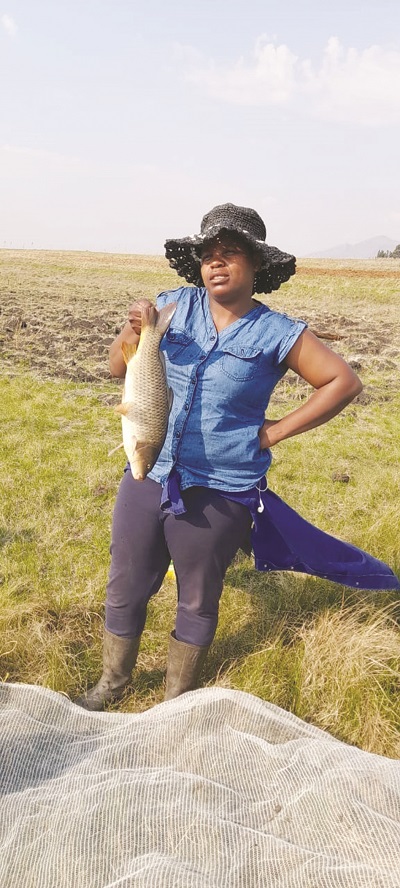By Moipone Letsosa
Maseru- Moratoe TEM holdings at Nazareth, is an integrated fish farmer, poultry and crop producer.
The local farmer Mrs. Mphatshoane aged 38 mentioned that this type of farming is environmentally friendly and cyclical in nature as chicken droppings are used to feed the fishes also used as fertilizers for the crops. She shared that she discovered this type of farming during droughts in 2015. During this era of harsh weather conditions, and inflation she saw cyclical farming as an opportunity to cut down on costs.
In 2015 when she started her business, she had only M10 000 as capital, which was not enough to sustain her project. She opted to buy cabbage seedlings instead and that helped a great deal and got her started. Fortunately for her land was not a factor as her family owns a large cropping field which she utilized to grow the crops. The challenge she faced was that of continuously increasing prices of seeds and a shortage of water for irrigation. She travelled quite a distance to collect some water from the local water reservoir.
In 2017, she acquired a loan from Lesotho Post Bank of M120 000.00 which she used to buy a green house and trays for growing cabbage. She experienced lots of rains that were caused by climate change. It was not easy to plough so she opted to shift to fish farming because of high precipitation that was causing crops not to survive thus causing low crop yield.
She bought 60 fishes with the help of Ministry of Agriculture in Department of Livestock as a startup. She then discovered that this was the greatest idea, she hire the boys from her village to dig a fish pond that was 10 by 3 meters and the business thrived.
She aims to introduce this method of farming to the young generation, train them on how to handle and take good care of fish so that they can multiply and help in the expansion of the economy. She explained that she would like to witness Basotho youth engage in various types of farming. “They should not wait to be hired”, stated Mrs. Mphatshoane. Her target market includes entrepreneurs from different districts in the country.
“In future Basotho should develop adaptive skills regarding their businesses, learn to be flexible and adapt to all conditions. Climate uncertainties are going nowhere, they need to find ways to succeed in their businesses regardless of the global warming”, she said.
Mrs. Mathato who is also a poultry and crop farmer said that this kind of farming reduces the rate of poverty. She is also happy to see young people strongly engaging in farming.
She expressed that her future goal is to provide Lesotho with massive amounts of fish and vegetables. So that the country stops their importation, rather export instead. She currently expecting aid from BEDCO so that she can build large fish ponds that will allow her to expand her produce and export as the ones she is using were build by The Ministry of forestry and are very small to cater for the massive produce she would like to have in the future, she indicated that her produce increases rapidly.


